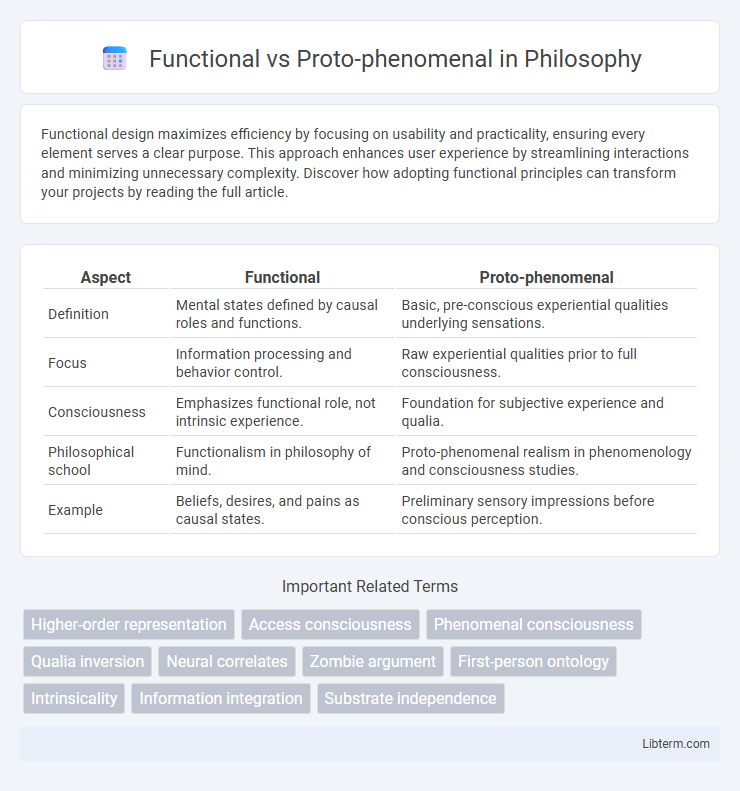Functional design maximizes efficiency by focusing on usability and practicality, ensuring every element serves a clear purpose. This approach enhances user experience by streamlining interactions and minimizing unnecessary complexity. Discover how adopting functional principles can transform your projects by reading the full article.
Table of Comparison
| Aspect | Functional | Proto-phenomenal |
|---|---|---|
| Definition | Mental states defined by causal roles and functions. | Basic, pre-conscious experiential qualities underlying sensations. |
| Focus | Information processing and behavior control. | Raw experiential qualities prior to full consciousness. |
| Consciousness | Emphasizes functional role, not intrinsic experience. | Foundation for subjective experience and qualia. |
| Philosophical school | Functionalism in philosophy of mind. | Proto-phenomenal realism in phenomenology and consciousness studies. |
| Example | Beliefs, desires, and pains as causal states. | Preliminary sensory impressions before conscious perception. |
Introduction to Functional and Proto-Phenomenal Concepts
Functional concepts describe mental states in terms of their causal roles and interactions within a cognitive system, emphasizing how these states process information and drive behavior. Proto-phenomenal concepts, by contrast, attempt to capture the intrinsic qualities of consciousness, focusing on the raw experiential aspects that underlie subjective awareness. Understanding the distinction between these frameworks is crucial for exploring the nature of mind and the explanatory gap between physical processes and conscious experience.
Defining Functional Consciousness
Functional consciousness is defined by the capacity to process information, generate responses, and support adaptive behavior without necessarily involving subjective experience. It emphasizes cognitive operations such as perception, memory, and decision-making, modeled in computational frameworks and artificial intelligence systems. This contrasts with proto-phenomenal consciousness, which centers on rudimentary sensory experiences and the qualitative aspects of awareness that may lack complex functional roles.
Understanding Proto-phenomenal States
Proto-phenomenal states refer to the basic, pre-conscious sensations that form the foundation of subjective experience, distinguishing them from purely functional states which involve cognitive processing and behavior. Understanding proto-phenomenal states is crucial for exploring the nature of consciousness, as these states represent the raw experiential qualities, or qualia, before they are interpreted by higher cognitive functions. This distinction aids in developing theories of mind that address how subjective awareness arises from neural activity.
Historical Background and Theoretical Roots
Functionalism emerged in the mid-20th century as a reaction to behaviorism and identity theory, emphasizing mental states defined by their causal roles rather than physical composition. Proto-phenomenal theories trace back to early philosophical inquiries into consciousness, suggesting that basic sensory qualities precede fully developed phenomenal experiences. Both frameworks draw from foundational debates in philosophy of mind, particularly concerning the nature of mental states and subjective experience.
Key Differences: Functional vs Proto-phenomenal
Functional consciousness refers to mental states defined by their causal roles and cognitive functions, emphasizing how information is processed and utilized. Proto-phenomenal consciousness involves raw, pre-reflective experiential qualities or qualia, representing the subjective feeling aspect of awareness. The key difference lies in functional consciousness prioritizing operational mechanisms, while proto-phenomenal consciousness centers on the intrinsic experiential properties.
Phenomenal Properties: What’s at Stake?
Phenomenal properties, central to the debate between functionalism and proto-phenomenal theories, refer to the subjective experience or "qualia" of consciousness, which functionalism struggles to fully capture through computational or causal roles alone. Proto-phenomenal properties suggest a more fundamental, intrinsic basis for experience, positing that even basic physical systems might possess a primitive form of consciousness. Understanding these distinctions is crucial for addressing the explanatory gap between objective brain functions and subjective phenomenology in the philosophy of mind.
Functionalism: Advantages and Critiques
Functionalism offers a robust framework for understanding mental states by emphasizing their causal roles and relations rather than their physical composition, enabling broad applicability across different systems including artificial intelligence. Advantages include its compatibility with multiple realizability, supporting the notion that mental states can be instantiated in diverse substrates, and its emphasis on cognitive processes aligns well with computational models. Critiques focus on its potential neglect of subjective experience, as functionalism may overlook qualia and the intrinsic qualities of consciousness, which proto-phenomenal approaches aim to address.
Proto-phenomenalism: Arguments and Challenges
Proto-phenomenalism posits that fundamental physical processes possess inherent proto-experiential qualities, offering a potential bridge between consciousness and physicalism by rooting experience in basic physical substrates. Key arguments emphasize its ability to address the hard problem of consciousness by attributing proto-experiences to elementary particles, thus explaining subjective phenomena without invoking dualism. Challenges include the difficulty of empirically verifying proto-qualities, the risk of panpsychism's overextension, and the need to clarify how proto-experiences aggregate into unified conscious states.
Bridging the Gap: Integrative Perspectives
Functional theories emphasize cognitive processes and computational mechanisms in explaining consciousness, while proto-phenomenal accounts focus on the intrinsic qualitative aspects of experience. Bridging the gap requires integrative frameworks that combine neurobiological data with phenomenological insights, highlighting how neural functions give rise to subjective qualities. Emerging approaches such as integrated information theory and predictive processing aim to unify functional dynamics with proto-phenomenal properties, advancing a comprehensive understanding of consciousness.
Implications for Consciousness Research
Functional theories emphasize cognitive processes and neural correlates, focusing on how systems produce behavior and mental states. Proto-phenomenal perspectives argue for the existence of basic experiential qualities that precede full conscious awareness, suggesting a more fundamental level of experience. This distinction influences consciousness research by shaping methodologies, with functional approaches favoring computational models and proto-phenomenal approaches advocating for investigating intrinsic experiential properties beyond functional descriptions.
Functional Infographic

 libterm.com
libterm.com